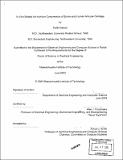In vitro models for injurious compression of bovine and human articular cartilage
Author(s)
Patwari, Parth, 1972-
DownloadFull printable version (12.43Mb)
Alternative title
In vitro models for investigating effects of injurious compression of articular cartilage
Other Contributors
Massachusetts Institute of Technology. Dept. of Electrical Engineering and Computer Science.
Advisor
Alan J. Grodzinsky.
Terms of use
Metadata
Show full item recordAbstract
Patients who have sustained a traumatic joint injury, such as a ligament rupture or cartilage fracture, are known to have an increased risk for the development of osteoarthritis (OA) in that joint. This has motivated the use of in vitro models of mechanical cartilage injury in order to identify processes that could lead to cartilage degradation. The overall aims of the work presented here has been to focus on further identification of the effects of in vitro injurious mechanical compression of cartilage on cell-mediated processes and to develop models for injurious compression of the cartilage that seek to incorporate interactions with other joint tissues, such as inflammatory mediators elaborated from the joint capsule tissue. Major results are that i) injurious compression of newborn bovine cartilage can result in cell death predominantly by an apoptotic mechanism; ii) incubation of mechanically injured bovine and human cartilage with exogenous cytokines produces a synergistic increase in proteoglycan loss from the cartilage; and iii) coincubation of cartilage with joint capsule tissue profoundly inhibits cartilage biosynthetic activity through an IL-1-independent pathway. We also characterize the activity and activation of ADAMTS-4 (aggrecanase-1) in the cartilage tissue, one of the major enzymes responsible for proteoglycan degradation. These results may help to identify some of the interactions between mechanical stimuli, joint tissue damage, and chondrocyte behavior which lead to unbalanced cartilage degradation and arthritis.
Description
Thesis (Sc. D.)--Massachusetts Institute of Technology, Dept. of Electrical Engineering and Computer Science, 2003. Includes bibliographical references (leaves 150-159).
Date issued
2003Department
Massachusetts Institute of Technology. Department of Electrical Engineering and Computer SciencePublisher
Massachusetts Institute of Technology
Keywords
Electrical Engineering and Computer Science.